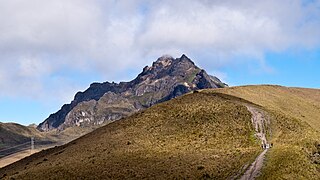Guagua is a municipality in Pampanga, Philippines.
Guagua may also refer to:
- Guagua (instrument), or catá, a Cuban percussion instrument
- Guagua language, or Piaroa, an indigenous language of Colombia and Venezuela
Guagua is a municipality in Pampanga, Philippines.
Guagua may also refer to:
Bow often refers to:

Pampanga, officially the Province of Pampanga, is a province in the Central Luzon region of the Philippines. Lying on the northern shore of Manila Bay, Pampanga is bordered by Tarlac to the north, Nueva Ecija to the northeast, Bulacan to the east, Manila Bay to the central-south, Bataan to the southwest and Zambales to the west. Its capital is the City of San Fernando. Angeles City is the largest LGU, but while geographically within Pampanga, it is classified as a first-class, highly urbanized city and has been governed independently of the province since it received its charter in 1964.

Pichincha is a stratovolcano in Ecuador. The capital Quito wraps around its eastern slopes.
Kim or KIM may refer to:
GNC may refer to:
Zhu or ZHU may refer to:
Betis can refer to:

Guagua, officially the Municipality of Guagua, is a 1st class municipality in the province of Pampanga, Philippines. According to the 2020 census, it has a population of 128,893 people.

Jorge Daniel Guagua Tamayo is an Ecuadorian retired professional footballer who played as a defender. He is currently a sporting director of Club 9 de Octubre.
Bro or BRO may refer to:

Rumba is a secular genre of Cuban music involving dance, percussion, and song. It originated in the northern regions of Cuba, mainly in urban Havana and Matanzas, during the late 19th century. It is based on African music and dance traditions, namely Abakuá and yuka, as well as the Spanish-based coros de clave. According to Argeliers León, rumba is one of the major "genre complexes" of Cuban music, and the term rumba complex is now commonly used by musicologists. This complex encompasses the three traditional forms of rumba, as well as their contemporary derivatives and other minor styles.

Canarian Spanish or Canary Island Spanish is a variant of standard Spanish spoken in the Canary Islands by the Canary Islanders.

Piaroa is an indigenous language of Colombia and Venezuela, native to the Huottüja people. Loukotka (1968) reports that it is spoken along the Sipapo River, Orinoco River, and Ventuari River.
Guagua National Colleges often called GNC is a private, non-sectarian Catholic school in Guagua, Pampanga, Philippines. It offers primary, secondary, and tertiary education. Guagua National Colleges founded by Fr. Nicanor M. Banzali, former parish priest of Guagua, Pampanga.
smag or variant, may refer to:
The catá or guagua is a Cuban percussion instrument which originated in the eastern region of the island. It is classified as a directly struck idiophone, traditionally made out of a hollowed tree trunk, which the player hits with wooden sticks or mallets. The resulting sound is dry and penetrating, similar to that of the claves, although with a different pitch. Of Congolese origin, it is an essential instrument in tumba francesa, yuka and some rumba ensembles.

Bo Kuangyi, more commonly known as Bo Guagua, is the second son of former Chinese politician Bo Xilai and the only child of Gu Kailai, his father's second wife.

Local elections was held in the Province of Pampanga on May 9, 2016, as part of the 2016 general election. Voters selected candidates for all local positions: a town mayor, vice mayor and town councilors, as well as members of the Sangguniang Panlalawigan, the vice-governor, governor and representatives for the four districts of Pampanga.

Guagua longganisa, also known as Candaba longganisa, is a Filipino pork sausage originating from the towns of Guagua and Candaba, Pampanga. It is a type of de recadolongganisa characterized by its salty and sour taste because of its heavier use of vinegar in comparison to other Filipino sausages.
Pampanga in the Philippine Revolution remained almost wholly loyal to Spanish suzerainty, with only few noble Kapampangan families defecting to the Katipunan. Kapampangan involvement in defending Spanish interests began when the Revolution broke out, with many freemen enlisting in Spanish forces. However, Tagalog rebels would eventually infiltrate the province and begin a campaign of terrorism. Once Spain lost the Battle of Manila Bay, Spanish forces in Pampanga retreated to Macabebe and awaited their return to Spain. Republican forces would raze and loot Kapampangan towns for their cooperation with Spanish forces. To revenge their losses, many Kapampangans would enlist with the Americans to defeat the Philippine Republic.